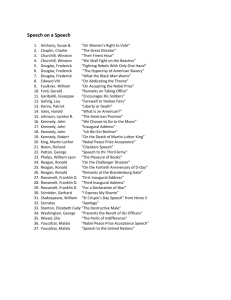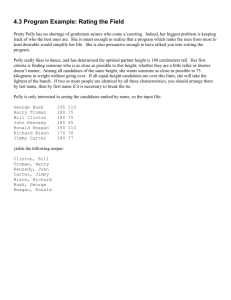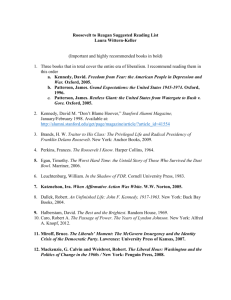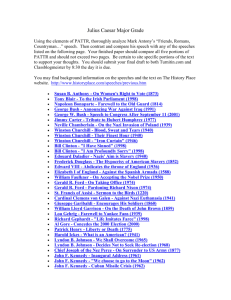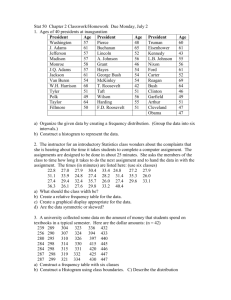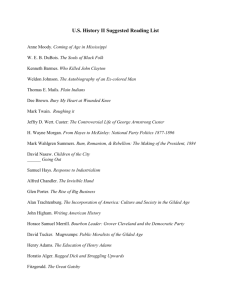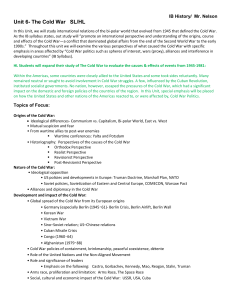Presidential Flash Cards since Lincoln
advertisement
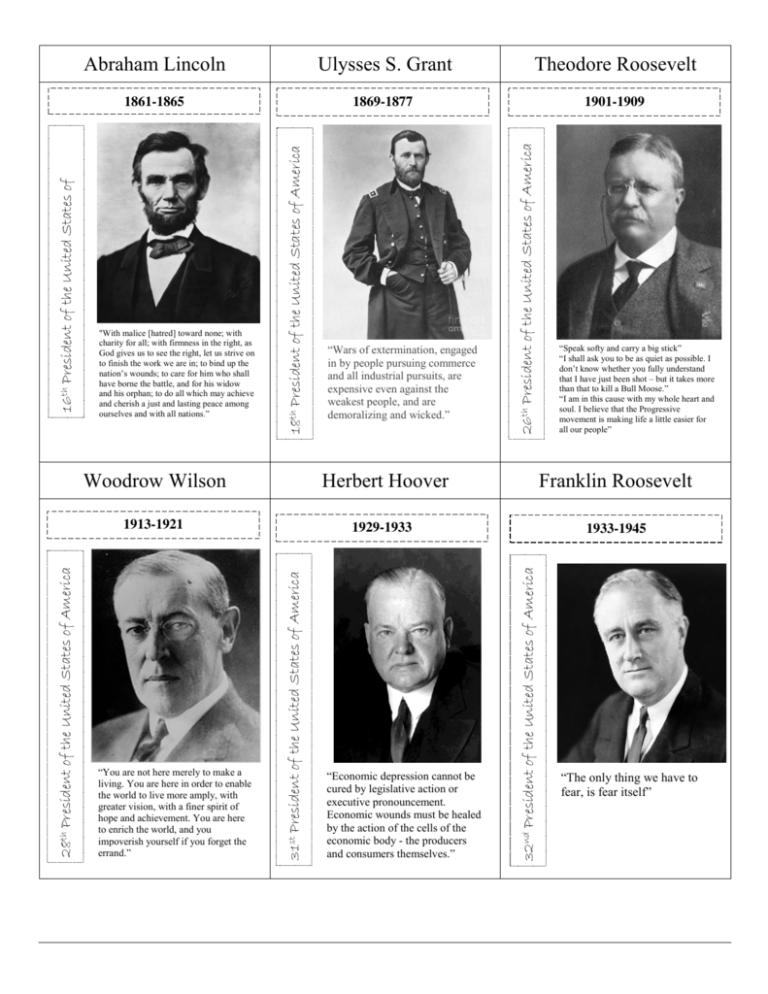
1861-1865 1869-1877 1901-1909 "With malice [hatred] toward none; with charity for all; with firmness in the right, as God gives us to see the right, let us strive on to finish the work we are in; to bind up the nation’s wounds;; to care for him who shall have borne the battle, and for his widow and his orphan; to do all which may achieve and cherish a just and lasting peace among ourselves and with all nations.” “Wars of extermination, engaged in by people pursuing commerce and all industrial pursuits, are expensive even against the weakest people, and are demoralizing and wicked.” 26th President of the United States of America Theodore Roosevelt 18th President of the United States of America Ulysses S. Grant “Speak softy and carry a big stick” “I shall ask you to be as quiet as possible. I don’t know whether you fully understand that I have just been shot – but it takes more than that to kill a Bull Moose.” “I am in this cause with my whole heart and soul. I believe that the Progressive movement is making life a little easier for all our people” Herbert Hoover Franklin Roosevelt 1913-1921 1929-1933 1933-1945 “You are not here merely to make a living. You are here in order to enable the world to live more amply, with greater vision, with a finer spirit of hope and achievement. You are here to enrich the world, and you impoverish yourself if you forget the errand.” Read more “Economic depression cannot be cured by legislative action or executive pronouncement. Economic wounds must be healed by the action of the cells of the economic body - the producers and consumers themselves.” 32nd President of the United States of America Woodrow Wilson 31st President of the United States of America 16th President of the United States of 28th President of the United States of America Abraham Lincoln “The only thing we have to fear, is fear itself” Theodore Roosevelt - Theodore Roosevelt was the leader of the Rough Riders during the Spanish American War. Theodore Roosevelt was the first progressive in the White House (the others were Taft and Wilson). He was a strong president who believed in using his position to influence the nation. During his two terms in office, he expanded presidential powers. Roosevelt proposed the Square Deal in which he believed all people should receive fair and honest treatment. Roosevelt began the trust busting movement with the Sherman Anti-trust Act and worked to protect consumers and workers with the Pure Food and Drug Act and Meat Inspection Act. Like other Progressives, Roosevelt supporting protecting the environment and conservation and established the US Forest Service. - - - - Ulysses S. Grant - - - - Franklin Roosevelt - - - - - - In 1932, Franklin Roosevelt launched an ambitious campaign tour and promoted the New Deal, a plan to do whatever was needed to help the needy and promote recovery. During the First Hundred Days of his administration, Congress enacted many programs to provide relief, promote recovery, and enact reforms. FDR took an active role to solving the problems of the Great Depression including the NIRA, AAA, TVA, CCC, WPA, and the SEC (Alphabet Soup). Franklin D. Roosevelt attempted to increase the number of US Supreme Court Justices which made the government more aware of checks and balances. Domestically, American industry began converting America’s industrial base to produce armaments and other war material, rather than civilian goods during WWII. Internationally, Roosevelt’s relationship with Winston Churchill led to the Lend Lease Act, which allowed the U.S. to support Britain’s war effort before the U.S. entered World War II. Ulysses S. Grant supported Congressional Reconstruction and promised to protect the rights of freedmen in the South. Under Grant, the Fifteenth Amendment was passed which states that “the right of citizens … to vote shall not be denied or abridged [limited] by the United States or bay any State on account of race, color, or previous condition of servitude.” Grant also dealt with widespread racism in the south with the resurgence of the Ku Klux Klan, a terror group that “opposed to negro equality, both social and political”. In 1870 and 1871, Congress took action to end the wave of terror by passing the Enforcement Acts. These laws made it a federal crime to deprive citizens of their civil rights. Grant sent federal marshals into the South to crush the terror group Abraham Lincoln - On January 1, 1863, Lincoln signed the Emancipation Proclamation, which declared all slaves living in states “in rebellion against the US” to be “thenceforward, and forever free” Several months later, Lincoln gave the Gettysburg Address noting that the war was testing whether a nation “conceived in liberty, and dedicated to the proposition that ‘all men are created equal’…can long endure”. President Abraham Lincoln was one of the last casualties of the Civil War. By the time of his death on April 14, 1985, more than half a million people had died in the struggle. Moreover, much of the South lay in ruins. Rebuilding cities like Richmond, Virginia, would be hard enough. Reconstructing a nation after such a long and bitter war would be even more difficult. - - Herbert Hoover - - - - Herbert Hoover strongly believed in selfreliance, rugged individualism, and hard work. He did not believe that the federal government should give aid to the needy, he worried, it would undermine self-reliance and encourage people to become dependent on government handouts. Instead, he supported “mutual self-help through voluntary giving”. Hoovervilles were shantytowns that homeless Americans in many cities built out of crude cardboard and tarpaper during the Great Depression. To deal with failing banks, he supported the creation of the Reconstruction Finance Corporation (RFC) which issued government loans to banks, railroads, and other big business. Hoover battled the Bonus Army during the Great Depression (WWI vets that wanted their bonus early) Hoover also attempted to help the economy with the construction of the Hoover Dam. Woodrow Wilson - - - - - Woodrow Wilson, the last progressive president, was a scholar and idealist. The president, he wrote in 1907, “is the only voice in national affairs. Let him once win the admiration and confidence of the country, and no other single force can withstand him, no combination of forces will easily overpower him.” As president, he set out to implement a reform called New Freedom, to eliminate all trusts and limit their power. Wilson expanded worker protection and supported an eight-hour workday – at least for some workers. In 1916, Wilson supported the creation of the National Park Service (NPS). Under Wilson, the 17th Amendment was ratified requiring the direct election of senators by popular votes. He wrote the Fourteen Points Plan which suggested freedom of the seas, reduced armaments, and a League of Nations, among other things. Wilson believed that providing collective security in the League of Nations would fix many problems that the Treaty of Versailles created but it fell short in Congress Harry S. Truman Dwight Eisenhower 1953-1961 35th President of the United States of America 34th President of the United States of America “I doubt whether any of these people [pacifists], with their academic or dogmatic hatred of war, detest it as much as I do. They probably have not seen bodies rotting on the ground and smelled the stench of decaying human flesh. What separates me from the pacifists is that I hate the Nazis more than I hate war.” 1961-1963 “Now the trumpet summons us again – not as a call to bear arms, though arms we need – not as a call to battle, though embattled we are – but a call to bear the burden of a long twilight struggle, year in and year out, ‘rejoicing in hope, patient in tribulation’ – a struggle against the common enemies of man: tyranny, poverty, disease and war itself.” Richard Nixon Jimmy Carter 1963-1969 1969-1974 1977-1981 “I am a free man, an American, a United States Senator, and a Democrat, in that order. I am also a liberal, a conservative, a Texan, a taxpayer, a rancher, a businessman, a consumer, a parent, a voter, and not as young as I used to be nor as old as I expect to be – and I am all of these things in no fixed order.” “I have never been a quitter. To leave office before my term is completed is abhorrent to every instinct in my body. Bus as President I must put the interests of America first…Therefore, I shall resign the presidency, effective at noon tomorrow.” 39th President of the United States of America Lyndon Johnson 37th President of the United States of America 36th President of the United States of America 32nd President of the United States of America 1945-1953 “Sixteen hours ago an American airplane dropped one bomb on Hiroshima…The force from which the sun draws it powers has been loosed against those who brought war to the Far East.” John F Kennedy “I thought a lot about our Nation and what I should do as President. And Sunday night before last, I made a speech about two problems of our country – energy and malaise.” John F. Kennedy Dwight Eisenhower - - - - - - In 1961, when John F. Kennedy, the youngest man elected to the presidency, replaced Dwight Eisenhower, one of the oldest presidents, the atmosphere in the White House changed. Kennedy worked to translate his New Frontier rhetoric into a list of concrete goals. However he had trouble getting his legislative agenda through Congress. After the Bay of Pigs invasion, people throughout Latin America criticized Kennedy for interfering in another country’s affairs. On October 22, 1962, Kennedy announced to the nation the discovery of the missile sites in Cuba and this became known as the Cuban Missile Crisis. Kennedy wanted to aid foreign countries and to spread this “know-how” he issued an executive order creating the Peace Corps. Tragically on November 22, 1963, Kennedy was assassinated in Texas by Lee Harvey Oswald. - - - - Jimmy Carter - - - - When Jimmy Carter took office, he wanted to “promote justice, equity, and human rights”. He took a step towards peace and won the Nobel Peace Prize with the Camp David Accords. However, the Iran Hostage Crisis would be an embarrassing moment for his presidency. An accident at the Three Mile Island Nuclear Generating Station in 1978 highlighted the potential dangers of nuclear energy that President Carter promoted. Harry S. Truman When Eisenhower took office, the United States and the Soviet Union were enthralled in the Cold War. As a response to NATO (1949), the Soviet Union, Albania, Bulgaria, Czechoslovakia, East Germany, Hungary, Poland, and Romania joined forces for mutual defense called the Warsaw Pact. Deep communist tensions lead to the Korean War in 1950 as part of the Containment Policy. The combination of deterrence revolved around developing a weapons arsenal so deadly that the Soviet Union would not dare to attack. The combination of deterrence and the willingness to use nuclear weapons came to be known as Mutual Assured Destruction (MAD). The 1950’s was a culture filled with fear and accusations as the atomic age included McCarthyism and fall out shelters. President Truman guided the transition from wartime to a peacetime economy. But he was unable to get his Fair Deal reform program approved by a Republican Congress. Immediately after the war, a series of labor strikes threatened to cripple the economy. In response, Congress passed the Taft-Hartley Act, which limited the power of unions. - - - - - - Richard Nixon - - - - - - President Nixon entered the White House with a mandate to change the course of the Vietnam War. He wanted to achieve “Peace with Honor”. When diplomacy failed with “Peace with Honor”, he tried Vietnamization and invading neighboring Cambodia. The Pentagon Papers revealed how previous administrations had deceived Congress and the public about Vietnam. Nixon reached out to conservatives with the plan, New Federalism, to reduce the size and power of the federal government. But he increased the power of the government with domestic policies such as Occupational Safety and Health Administration (OSHA), and the Environmental Protection Agency (EPA). Nixon struggled with an energy crisis when OPEC placed an oil embargo on the U.S. but his international policy was successful in relaxing tensions (détente) with Communist China and the Soviet Union. Nixon would eventually resign from office in disgrace when the Watergate scandal revealed that he was involved in the cover up. After the successful test of the atomic bomb, or Abomb, President Truman had to decide whether to drop the bomb on Japan or to launch an invasion. Truman stuck to his demand for an unconditional surrender. On August 6, 1945 an atomic bomb was dropped on Hiroshima, Japan. Then three days later, another bomb was dropped on Nagasaki, ending World War II. After WWII a new organization called the United Nations was formed to help “lay the foundations upon which, after victory, peace, freedom, and a growing prosperity may be built for generations to come.” The Universal Declaration of Human Rights (1948) affirms basic human rights, including life, liberty, and equality before the law, as well as to freedom of religion, expression, and assembly. Truman declared in the Truman Doctrine, “to support free peoples who are resisting attempted subjugation [conquest] by armed minorities or by outside pressures” to stop the spread of Communism. The Marshall Plan also offered all European nations, including the Soviet Union, generous funding to rebuild their economies as long as the money was spent on goods made in the U.S. Lyndon Johnson - - - - - In contrast to Harvard-education Kennedy, Lyndon Johnson was a rough-hewn Texan. He served in Congress for 23 years before becoming vice president. A master of the legislative process, Johnson had far more political experience than Kennedy. Comparing the two presidents, one journalist said, “Kennedy inspired…Johnson delivered.” Johnson’s Great Society grew out of the liberal tradition of the Progressive and New Deal eras. Its centerpiece was an ambitious War on Poverty. The Economic Opportunity Act created an umber of antipoverty measures, including the Job Corps, Project Head Start, and VISTA, which all helped cut poverty rates almost in half. As part of the Great Society, Congress amended the Social Security Act to include medical health insurance for the elderly and disabled. The Immigration Act of 1965 ended the national origins quota system that began in the 1920s. US entry was now based on criteria such as skills and family ties. In a series of controversial decisions, the Warren Court expanded the rights of the accused. It ensured that people placed under arrest be informed of their rights before questioning. During the Vietnam War, Johnson increased troops and it would ultimately be the deciding factor on him not running for reelection Bill Clinton 1981-1989 1989-1993 1993-2001 “Let us beware that while [Soviet leaders] preach the supremacy of the state, declare its omnipotence over individual man, and predict its eventual domination over all the peoples of the earth, they are the focus of evil in the modern world” “The Congress will push me to raise taxes, and I’ll say no, and they’ll push, and I’ll say no, and they’ll push again. And all I can say is ready my lips: No New Taxes.” 42nd President of the United States of America George H.W. Bush 41st President of the United States of America “The real differences around the world today are not between Jews and Arabs, Protestants and Catholics; Muslims, Croats and Serbs. The real differences are between those who embrace peace and those who would destroy it; between those who look to the future and those who cling to the past; between those who open their arms and those who are determined to clench their fists.” George W. Bush Barack Obama 2001-2009 2009-present “To those of you who received honors, awards and distinctions, I say well done. And to the C students, I say you, too, can be president of the United States.” 44th President of the United States of America 40th President of the United States of America 43rd President of the United States of America Ronald Reagan “The pundits like to slice and dice our country into red states and blue states. Red states for Republicans, blue states for Democrats. But I’ve got news for them, too. We worship an awesome God in the blue states, and we don’t like federal agents poking around in our libraries in the red states. We coach Little League in the blue states and, yes, we’ve got some gay friends in the red states.” Bill Clinton As a moderate New Democrat, Clinton breathed new life into the Democratic coalition. One of his main legacies is welfare reform. Clinton failed to enact universal health care, however. In his second term, Clinton was impeached but not removed from office. In the 1994 midterm elections, Republicans won control of Congress with their 10-point Contract with America. Ethnic conflicts in various countries prompted mixed responses from the United States. In the former Yugoslavia, the United States backed NATO military actions against ethnic cleansing. However, it failed to stop genocide in Rwanda. The United States offered humanitarian aid to ease suffering in Somalia and North Korea, but with mixed results. The HIV/AIDS crisis in Africa prompted concern but little action. In 1994, Congress ratified a new version of the General Agreement on Tariffs and Trade (GATT). It also established the World Trade Organization (WTO). The main function of the WTO is to set trade policies and mediate disputes among members. In 1993, Muslim terrorists set off a bomb beneath the World Trade Center in New York City. In 1998, the U.S. embassies in the East African nations of Kenya and Tanzania were bombed. In 2000, terrorists attacked the USS Cole, a Navy destroyer anchored off the coast of the Arab nation of Yemen. - - - - - George H.W. Bush - - - In 1988, Bush appealed to Reagan Republicans with his campaign pledges to expand the economy, not raise taxes, and create a “kinder, gentler” America. After a costly bailout of the savings and loans crisis, he broke the no-taxes pledge in an effort to balance the federal budget. The United States worked to oust an aggressive dictator in Panama. In the Persian Gulf War, it fought alongside other nations to force Iraqi dictator Saddam Hussein out of Kuwait. In the early 1990’s, President George H.W. Bush began to work for passage of the North American Free Trade Agreement (NAFTA) which would create a free-trade zone among the United States, Mexico, and Canada. Ronald Reagan - - - - Reagan’s conservative agenda called for lower taxes, reduced government regulation of business, and cuts in spending on social programs became known as the Reagan Revolution. Reagan’s strongest support came from the New Right, a movement of conservative activists and organizations. This movement included evangelical Christian organizations like the Moral Majority. Reagan’s economic plan was based on supply-side economics. He cut taxes to stimulate business activity, arguing that this would boost the economy and produce jobs. Tax cuts and increased defense spending, however, led to large budget deficits and a huge national debt. Reagan called for reducing regulations on business and the environment. He also cut spending on social services. The Supreme Court moved to the right under Reagan. Reagan increased military spending to counter the Soviet threat by designing the Strategic Defense Initiative (SDI). The Reagan Doctrine backed anticommunist movements around the world. Reagan sent U.S. peacekeeping forces to Lebanon. The Reagan administration faced a scandal over arms sales to Iran and the diversion of funds to the Contras with the Iran-Contra Affair. - Barack Obama - - President Obama is the first African American president of the United States. President Obama’s years of public service are based around his unwavering belief in the ability to unite people around a politics of purpose. He passed the first major ethics reforms in 25 years, cut taxes for working families, and expanded health care for children and their parents. In his first term, the President passed the landmark Affordable Care Act, helping to put quality health care within reach for more Americans. He ended the war in Iraq and is working to responsibly end the war in Afghanistan. He also passed historical Wall Street reform to make sure taxpayers never again have to bail out big banks and cut taxes for every American worker. He’s fought for equal rights and woman’s right to make her own health decisions. And he’s made a college education more affordable for millions of students and their families. The President believes an economy that’s built to last starts with a strong and growing middle class – that’s why he has a plan to create jobs and restore economic security to working families. George Bush - - - In the 2000 election, Al Gore led George W. Bush in the popular vote by a very thin margin. The Supreme Court decided the outcome, denying Gore’s demand for a recount in Florida. As a candidate, Bush reached out to moderates with his compassionate conservatism. One of his main legacies is education reform. However, Bush failed to reform the Social Security system. On September 11, 2001, terrorists hijacked four airplanes. They smashed three of the planes into buildings in New York City and Washington, D.C. In the days that followed, Americans learned that an international terrorist network called al Qaeda had carried out the 9/11 attacks.
